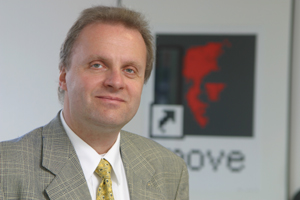Prof. Dr.-Ing. Wolfgang Nebel
|
|

Biography
Prof. Dr.-Ing. Nebel holds a degree in EE from
Hanover University, Germany, and a Dr.-Ing. degree from the
CS department of Kaiserslautern University. From 1987 to 1993
he worked with Philips Semiconductors as a development engineer,
project manager and manager of the CAD Software Development.
Since 1993 he is full professor at Oldenburg University, where
he teaches Embedded HW/SW Systems. His research is focused
on low power system design methodologies and tools as well
as on system level specification and synthesis. Dr. Nebel
is a member of the board of the OFFIS research institute in
Oldenburg. He served as Dean of the CS Department and 1st
Vice-President of Oldenburg University. Dr. Nebel is Chairman,
Chief Technology Advisor and co-founder of ChipVision Design
Systems, Oldenburg, Munich, San Jose and San Ramon, CA. Dr.
Nebel is a member of the IEEE, ACM, GI, VDE, EDAA and edaCentrum.
Abstract
Unparalleled by any other innovation the IT
technologies had a disruptive impact on the human society
in Europe, in the western world and globally. They have created
a world in which access to almost any kind of information
at any place at any time is possible for almost everybody.
This infrastructure in itself has created a new industry offering
services and content. It has also created a market for the
information and people are prepared to pay for these services.
It is obvious that the location of such an information provider
is almost irrelevant. But similarly in many cases it is irrelevant
where other products or services are created as long as an
instantaneous transfer of information to the production or
to the service is possible. IT has speeded up the globalization
to a pace which disrupts many processes, structures and claims
we have got used to – in economy, employment and social
security. Our societies can purchase almost any good or service
from the supplier who offers the best value for the prize
irrespectively of his location. This allows us to have a high
standard of living here because many products we consume are
affordable due to low labor cost at their origin. On the other
hand our production and services in Europe need to be competitive
in their respective markets. Competition means that the complete
offering in Europe must be competitive under consideration
of the cost of labor, the productivity, the infrastructure,
the social, legal and financial stability. It is inevitable
that a competition in labor intensive business sectors not
requiring highest human skills will directly lead to a competition
of the labor cost. In order to maintain the high level of
living for the European citizens, it is essential to seek
competition not in these domains, but in industries which
compete on leading edge technologies and innovations for which
the rest of the world is prepared to pay premium prizes. Of
course again IT is the source of many such value adding technologies,
products, services and features.
Europe has a strong tradition of Small and Medium-size Enterprises
(SMEs) being the driving force of innovation, employment,
and wealth of a strong middle class. The SMEs draw their potential
out of entrepreneurship meeting flexibility. In many cases
the capital and the business on the one hand and the management
and the technology are in the hands of a single owner or a
small group. SMEs can react quickly, fill market niches and
exploit opportunities much faster than large corporations.
These advantages of SMEs can be the applied to Research Institutes
as well. Their motivation and way of working can be a blue-print
for the success of Small and Medium-size Institutes (SMIs).
The role of European SMIs in a globalized world is to help
Europe to claim innovation in promising areas and to consolidate
the strategic lead of Europe in advanced technologies. Their
role is to increase the innovation by creating inventions
and transferring them into innovation. They need to be incubators
of exploitation strategies of new technologies for growth
and employment in Europe.
The Oldenburger Forschungs- und Entwicklungsinstitute für
Informatik-Werkzeuge und –Systeme (Oldenburg Research
and Development Institute for Information Technology Tools
and Systems), OFFIS, is located in Oldenburg, in the North-West
of Germany. It is such a SMI with its some 200 employees including
more than 100 full time scientists. OFFIS was founded in 1991
by Oldenburg University, faculty of the Computer Science Department
and the state of Lower Saxony. The institute is very closely
co-operating with Oldenburg University. OFFIS has six research
and development divisions covering a spectrum of domains ranging
from Nanohandling and Microrobotics through Embedded HW-SW-Systems
and Safety Critical Systems to Healthcare Information and
Communication Systems and Business Information Systems, and
finally to Multimedia and Internet Information Systems. The
objective of OFFIS at the date of its founding was closely
related to bridge the gap between fundamental research at
the university to the applications needed in the region. Further
it should provide a subsidy for the missing high-tech industry
in the nearby region. Now, the transfer objective is going
much further. OFFIS is engaged in international research projects
and co-operating with industries and academic organizations
throughout the entire Europe. In this presentation we will
exemplify the role of SMIs and their objectives, structures,
and approaches based on the experience made at the OFFIS.
|

